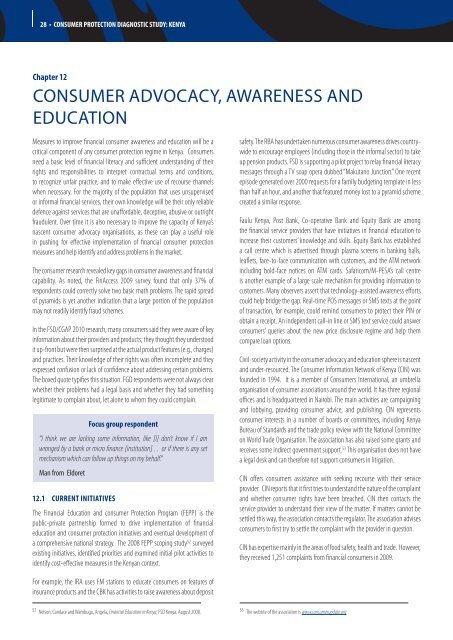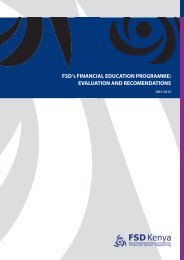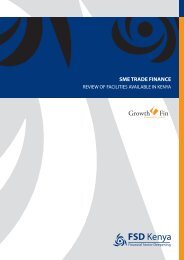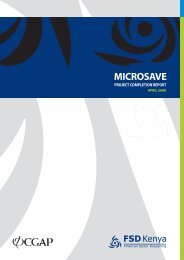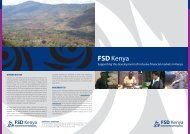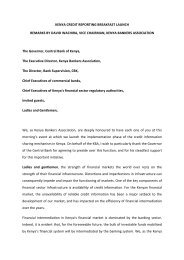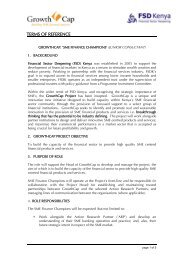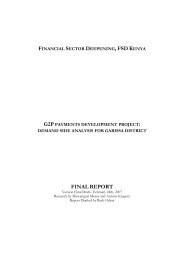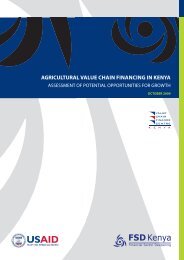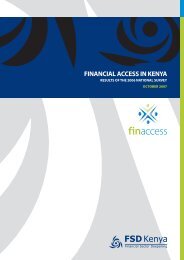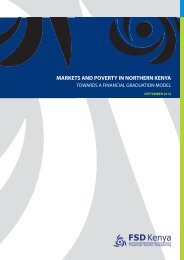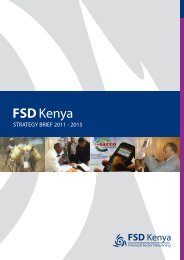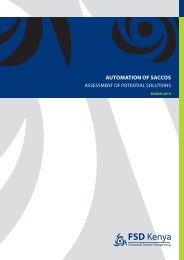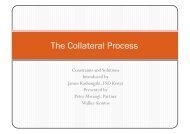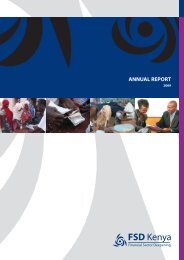Consumer protection diagnostic study - FSD Kenya
Consumer protection diagnostic study - FSD Kenya
Consumer protection diagnostic study - FSD Kenya
Create successful ePaper yourself
Turn your PDF publications into a flip-book with our unique Google optimized e-Paper software.
28 • CONSUMER PROTECTION DIAGNOSTIC STUDY: KENYA<br />
Chapter 12<br />
COnSUMeR aDVOCaCy, aWaReneSS anD<br />
eDUCaTIOn<br />
Measures to improve financial consumer awareness and education will be a<br />
critical component of any consumer <strong>protection</strong> regime in <strong>Kenya</strong>. <strong>Consumer</strong>s<br />
need a basic level of financial literacy and sufficient understanding of their<br />
rights and responsibilities to interpret contractual terms and conditions,<br />
to recognize unfair practice, and to make effective use of recourse channels<br />
when necessary. For the majority of the population that uses unsupervised<br />
or informal financial services, their own knowledge will be their only reliable<br />
defence against services that are unaffordable, deceptive, abusive or outright<br />
fraudulent. Over time it is also necessary to improve the capacity of <strong>Kenya</strong>’s<br />
nascent consumer advocacy organisations, as these can play a useful role<br />
in pushing for effective implementation of financial consumer <strong>protection</strong><br />
measures and help identify and address problems in the market.<br />
The consumer research revealed key gaps in consumer awareness and financial<br />
capability. As noted, the FinAccess 2009 survey found that only 37% of<br />
respondents could correctly solve two basic math problems. The rapid spread<br />
of pyramids is yet another indication that a large portion of the population<br />
may not readily identify fraud schemes.<br />
In the <strong>FSD</strong>/CGAP 2010 research, many consumers said they were aware of key<br />
information about their providers and products; they thought they understood<br />
it up-front but were then surprised at the actual product features (e.g., charges)<br />
and practices. Their knowledge of their rights was often incomplete and they<br />
expressed confusion or lack of confidence about addressing certain problems.<br />
The boxed quote typifies this situation. FGD respondents were not always clear<br />
whether their problems had a legal basis and whether they had something<br />
legitimate to complain about, let alone to whom they could complain.<br />
12.1 CURRENT INITIATIVES<br />
Focus group respondent<br />
“I think we are lacking some information, like [I] don’t know if I am<br />
wronged by a bank or micro finance [institution] . . or if there is any set<br />
mechanism which can follow up things on my behalf.”<br />
Man from Eldoret<br />
The Financial Education and consumer Protection Program (FEPP) is the<br />
public-private partnership formed to drive implementation of financial<br />
education and consumer <strong>protection</strong> initiatives and eventual development of<br />
a comprehensive national strategy. The 2008 FEPP scoping <strong>study</strong> 52 surveyed<br />
existing initiatives, identified priorities and examined initial pilot activities to<br />
identify cost-effective measures in the <strong>Kenya</strong>n context.<br />
For example, the IRA uses FM stations to educate consumers on features of<br />
insurance products and the CBK has activities to raise awareness about deposit<br />
52 Nelson, Candace and Wambugu, Angela, Financial Education in <strong>Kenya</strong>, <strong>FSD</strong> <strong>Kenya</strong>, August 2008.<br />
safety. The RBA has undertaken numerous consumer awareness drives countrywide<br />
to encourage employees (including those in the informal sector) to take<br />
up pension products. <strong>FSD</strong> is supporting a pilot project to relay financial literacy<br />
messages through a TV soap opera dubbed “Makutano Junction.” One recent<br />
episode generated over 2000 requests for a family budgeting template in less<br />
than half an hour, and another that featured money lost to a pyramid scheme<br />
created a similar response.<br />
Faulu <strong>Kenya</strong>, Post Bank, Co-operative Bank and Equity Bank are among<br />
the financial service providers that have initiatives in financial education to<br />
increase their customers’ knowledge and skills. Equity Bank has established<br />
a call centre which is advertised through plasma screens in banking halls,<br />
leaflets, face-to-face communication with customers, and the ATM network<br />
including bold-face notices on ATM cards. Safaricom/M-PESA’s call centre<br />
is another example of a large scale mechanism for providing information to<br />
customers. Many observers assert that technology-assisted awareness efforts<br />
could help bridge the gap. Real-time POS messages or SMS texts at the point<br />
of transaction, for example, could remind consumers to protect their PIN or<br />
obtain a receipt. An independent call-in line or SMS text service could answer<br />
consumers’ queries about the new price disclosure regime and help them<br />
compare loan options.<br />
Civil-society activity in the consumer advocacy and education sphere is nascent<br />
and under-resourced. The <strong>Consumer</strong> Information Network of <strong>Kenya</strong> (CIN) was<br />
founded in 1994. It is a member of <strong>Consumer</strong>s International, an umbrella<br />
organisation of consumer associations around the world. It has three regional<br />
offices and is headquartered in Nairobi. The main activities are campaigning<br />
and lobbying, providing consumer advice, and publishing. CIN represents<br />
consumer interests in a number of boards or committees, including <strong>Kenya</strong><br />
Bureau of Standards and the trade policy review with the National Committee<br />
on World Trade Organisation. The association has also raised some grants and<br />
receives some indirect government support. 53 This organisation does not have<br />
a legal desk and can therefore not support consumers in litigation.<br />
CIN offers consumers assistance with seeking recourse with their service<br />
provider. CIN reports that it first tries to understand the nature of the complaint<br />
and whether consumer rights have been breached. CIN then contacts the<br />
service provider to understand their view of the matter. If matters cannot be<br />
settled this way, the association contacts the regulator. The association advises<br />
consumers to first try to settle the complaint with the provider in question.<br />
CIN has expertise mainly in the areas of food safety, health and trade. However,<br />
they received 1,251 complaints from financial consumers in 2009.<br />
53 The website of the association is www.consumerupdate.org


